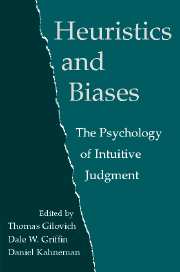Book contents
- Frontmatter
- Contents
- List of Contributors
- Preface
- Introduction – Heuristics and Biases: Then and Now
- PART ONE THEORETICAL AND EMPIRICAL EXTENSIONS
- 1 Extensional versus Intuitive Reasoning
- 2 Representativeness Revisited: Attribute Substitution in Intuitive Judgment
- 3 How Alike Is It? versus How Likely Is It?: A Disjunction Fallacy in Probability Judgments
- 4 Imagining Can Heighten or Lower the Perceived Likelihood of Contracting a Disease: The Mediating Effect of Ease of Imagery
- 5 The Availability Heuristic Revisited: Ease of Recall and Content of Recall as Distinct Sources of Information
- 6 Incorporating the Irrelevant: Anchors in Judgments of Belief and Value
- 7 Putting Adjustment Back in the Anchoring and Adjustment Heuristic
- 8 Self-Anchoring in Conversation: Why Language Users Do Not Do What They “Should”
- 9 Inferential Correction
- 10 Mental Contamination and the Debiasing Problem
- 11 Sympathetic Magical Thinking: The Contagion and Similarity “Heuristics”
- 12 Compatibility Effects in Judgment and Choice
- 13 The Weighing of Evidence and the Determinants of Confidence
- 14 Inside the Planning Fallacy: The Causes and Consequences of Optimistic Time Predictions
- 15 Probability Judgment across Cultures
- 16 Durability Bias in Affective Forecasting
- 17 Resistance of Personal Risk Perceptions to Debiasing Interventions
- 18 Ambiguity and Self-Evaluation: The Role of Idiosyncratic Trait Definitions in Self-Serving Assessments of Ability
- 19 When Predictions Fail: The Dilemma of Unrealistic Optimism
- 20 Norm Theory: Comparing Reality to Its Alternatives
- 21 Counterfactual Thought, Regret, and Superstition: How to Avoid Kicking Yourself
- PART TWO NEW THEORETICAL DIRECTIONS
- PART THREE REAL-WORLD APPLICATIONS
- References
- Index
21 - Counterfactual Thought, Regret, and Superstition: How to Avoid Kicking Yourself
from PART ONE - THEORETICAL AND EMPIRICAL EXTENSIONS
Published online by Cambridge University Press: 05 June 2012
- Frontmatter
- Contents
- List of Contributors
- Preface
- Introduction – Heuristics and Biases: Then and Now
- PART ONE THEORETICAL AND EMPIRICAL EXTENSIONS
- 1 Extensional versus Intuitive Reasoning
- 2 Representativeness Revisited: Attribute Substitution in Intuitive Judgment
- 3 How Alike Is It? versus How Likely Is It?: A Disjunction Fallacy in Probability Judgments
- 4 Imagining Can Heighten or Lower the Perceived Likelihood of Contracting a Disease: The Mediating Effect of Ease of Imagery
- 5 The Availability Heuristic Revisited: Ease of Recall and Content of Recall as Distinct Sources of Information
- 6 Incorporating the Irrelevant: Anchors in Judgments of Belief and Value
- 7 Putting Adjustment Back in the Anchoring and Adjustment Heuristic
- 8 Self-Anchoring in Conversation: Why Language Users Do Not Do What They “Should”
- 9 Inferential Correction
- 10 Mental Contamination and the Debiasing Problem
- 11 Sympathetic Magical Thinking: The Contagion and Similarity “Heuristics”
- 12 Compatibility Effects in Judgment and Choice
- 13 The Weighing of Evidence and the Determinants of Confidence
- 14 Inside the Planning Fallacy: The Causes and Consequences of Optimistic Time Predictions
- 15 Probability Judgment across Cultures
- 16 Durability Bias in Affective Forecasting
- 17 Resistance of Personal Risk Perceptions to Debiasing Interventions
- 18 Ambiguity and Self-Evaluation: The Role of Idiosyncratic Trait Definitions in Self-Serving Assessments of Ability
- 19 When Predictions Fail: The Dilemma of Unrealistic Optimism
- 20 Norm Theory: Comparing Reality to Its Alternatives
- 21 Counterfactual Thought, Regret, and Superstition: How to Avoid Kicking Yourself
- PART TWO NEW THEORETICAL DIRECTIONS
- PART THREE REAL-WORLD APPLICATIONS
- References
- Index
Summary
Some years ago, a charismatic 19-year-old Spanish matador nicknamed “Yiyo” was gored to death. Yiyo's death evoked considerable public anguish and debate (Schumacher, 1985). Making his fans' reaction especially intense was the circumstance of his death: He was killed while serving as a last-minute substitute for another matador. Students of counterfactual thinking can be forgiven sly smiles and knowing nods as they read this story, for it contains all the elements necessary to provide a dramatic test of the oft-cited hypothesis that events preceded by exceptional actions, such as substituting for another matador, are more easily imagined otherwise and generate more affect than events preceded by routine actions. A simple test of this hypothesis, first proposed by Kahneman and Tversky (1982b), would contrast the highly “mutable” fate of poor Yiyo with the less mutable fate of some other unfortunate “Yiyo” who had been killed by a bull he had long been scheduled to face. The two versions of the event could be presented to participants in scenario format and their reactions probed through a list of questions that might include the following: Did you have any “if only” thoughts when reading of Yiyo's death? How intense was your affective reaction to Yiyo's death? What degree of regret do you think Yiyo would have experienced if he had suffered only serious injuries rather than death?
- Type
- Chapter
- Information
- Heuristics and BiasesThe Psychology of Intuitive Judgment, pp. 367 - 378Publisher: Cambridge University PressPrint publication year: 2002
- 8
- Cited by



